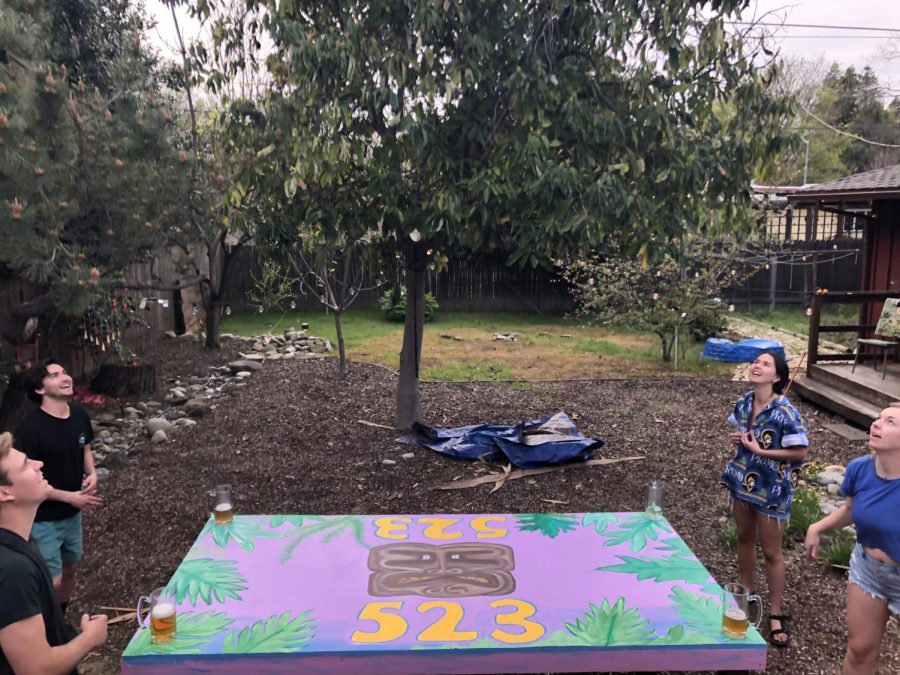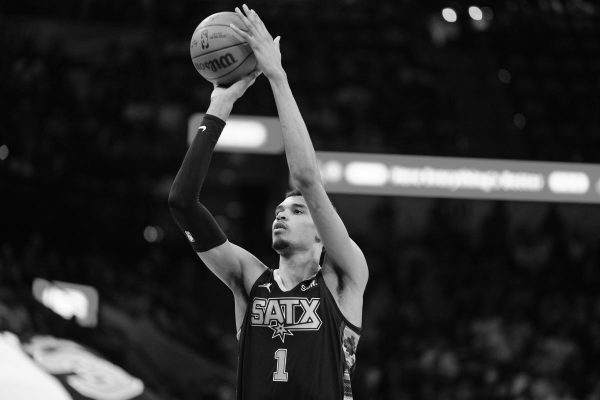Outdoor Drinking Games Call for Athletic Excellence
A group of friends plays beer die in their backyard.
As we inch closer to summer, outdoor yard games become a central part of American life. To many, these games are seen as a way to kill time with friends or an excuse to day drink, but they also shed light on complex athletic and cultural dynamics.
Fourth-year Yanni Sarrimanolis thinks his football team’s tradition of beer die is a way he and his teammates can continue to compete at a high level during their offseason.
“You’re not just sitting around drinking,” he said. “You’re moving, you’re getting active. You have to be able to run around a table and pivot. It translates well physically. It’s also a cultural thing. It gets competitive sometimes.”
Beer die can certainly be an opportunity for people to display athletic prowess. It involves throwing a die at least eight feet into the air with the goal of landing it in the opponent’s cups or getting it to bounce off the table and onto the ground. Opponents can steal a point by catching the die after it hits the table.
Sarrimanolis talked about how making up rules can add intensity to the game. He discussed one unique rule he’s followed that forces any player who lands the die in their own cup to call their mom and apologize for their embarrassing performance in the game in front of everybody.
“I’ve done that twice in my career, which is too many, but my mom thought it was funny both times,” he said.
Spikeball is another game that has grabbed the attention of backyard athletes and daytime drinkers over the last several years. Third-year Sander Ferrazza enjoys the game, but feels a burden as the owner of the spikeball set within his friend group.
“As the owner… you have to supervise the net,” he said. “There was an incident where I lent it out and it came back broken. All was resolved, but there’s a lot of pressure.”
The tension of the spikeball net itself is something that requires great attention to detail, which Ferrazza emphasizes.
“You go back and forth — it’s a fine-tuned process,” he said. “You have to adjust to the humidity. There’s a lot of conditions that affect the gameplay, so you have to get it perfect.”
While spikeball is supposed to be a fun game, debate over the rules can spark conflict. One of the most hotly debated rules in spikeball is whether a point can be awarded after the ball bounces off a pocket created by the net and rim. The official rules state that pockets are only disallowed on serves, but that does not stop players from challenging them.
“It depends on regional differences,” Ferrazza said. “I’ve played it where hitting a pocket counts, I’ve played where it doesn’t count, I’ve even played where it counts to hit the rim. I prefer the pocket to be played. It’s just a part of the game.”
Cornhole, a Midwestern staple, is a game third-year baseball player Jackson Schaum has a passion for.
“If you’re someone who comes into the Midwest and doesn’t know what cornhole is or refer to it with the wrong name like ‘bags,’ you might be executed, or at least publicly shamed by a Midwesterner,” he said. “You can’t say you’ve truly visited the Midwest until you’ve played cornhole.”
Although he speaks highly of the game, which centers around throwing bags filled with corn or beans into a hole in a wooden board propped up at a 10-degree angle, Schaum does not believe there is anything incredibly unique about it.
“It’s kind of the same [as other games] but we hold it near and dear to our hearts,” he said.
Beer pong might just be the favorite outdoor party game among American college students. While it is a simple game on the surface, there are many intricacies involved in achieving success. Schaum is known for his diagonal line-up method when shooting.
“I figure that I’m pretty good at getting it directionally the right way, but determining the depth is often questionable,” he said. “If I give myself a straight line of cups to shoot at, I have a wider margin for error.”
Third-year Thayer Preston is a streaky player but can get extremely hot with his straight-to-the-cup line drive approach of shooting.
“With all athletes, you go in and out of form,” he said. “Some nights, if you’re feeling it, you’re tossing underhands and left hands. It’s all about finding a rhythm and sticking with that.”
Preston recalled a night on campus last year when he won a one-vs.-one beer pong tournament due to his tremendously hot shooting.
“When you’re going off, it feels good,” he said. “Real good.”




